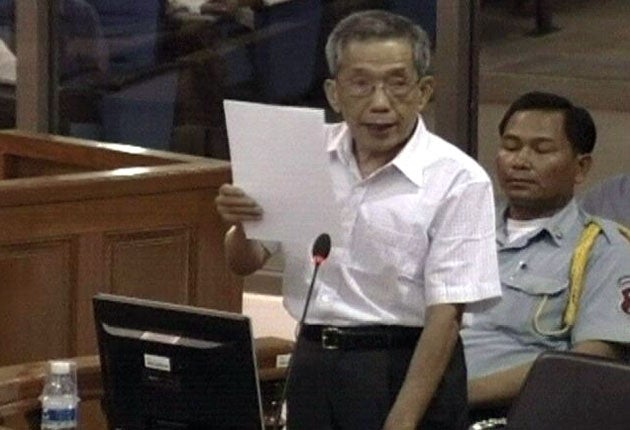Khmer Rouge jail boss begs for forgiveness
Comrade Duch makes impassioned speech to genocide tribunal

Your support helps us to tell the story
From reproductive rights to climate change to Big Tech, The Independent is on the ground when the story is developing. Whether it's investigating the financials of Elon Musk's pro-Trump PAC or producing our latest documentary, 'The A Word', which shines a light on the American women fighting for reproductive rights, we know how important it is to parse out the facts from the messaging.
At such a critical moment in US history, we need reporters on the ground. Your donation allows us to keep sending journalists to speak to both sides of the story.
The Independent is trusted by Americans across the entire political spectrum. And unlike many other quality news outlets, we choose not to lock Americans out of our reporting and analysis with paywalls. We believe quality journalism should be available to everyone, paid for by those who can afford it.
Your support makes all the difference.The man who was in charge of a notorious prison operated by the Khmer Rouge in which thousands were tortured and dispatched for execution has offered his "heartfelt sorrow" for his actions 30 years ago.
Appearing in front a genocide tribunal in Cambodia, Kaing Guek Eav, also known as Comrade Duch, said he did not expect the families of those who died to forgive him now but he hoped that at some point they would.
"My current plea is that I would like you to please leave an open window for me to seek forgiveness," he said. He would give his full co-operation to the UN-sponsored tribunal, he said, adding: "This is only the remedy that can help me to relieve all the sorrow and crimes I have committed."
Up to 1.8 million people died or were murdered by the Maoist Khmer Rouge regime, which ruled from 1975 to 1979. Duch, 66, was the head of the Tuol Sleng prison in the capital, Phnom Penh. Also known as S-21, the converted school was used to interrogate and torture so-called "internal enemies", namely regime members suspected or accused of dissent. Of the 14,000 prisoners sent to the jail, only a dozen survived. Just a handful are still alive today.
Duch is one of five senior Khmer Rouge leaders being tried for genocide. While his statements amounted to a confession of guilt, defendants are not required to enter pleas. A panel of judges will deliver a verdict.
After the prosecution's opening arguments, which described Duch as a key cog in the Khmer Rouge killing machine, the defendant asked permission to make a personal statement. He began by reading from a document but then put down his papers, removed his spectacles and stared at the 500 or so people gathered in the court room.
He claimed that he had tried to avoid being made commander of S-21, but once assigned he feared for his own life and his family's safety if he did not carry out the job.
He then apologised to his victims' families but said he was not asking to be pardoned for such "serious crimes that cannot be tolerated".
The tribunal has made clear that it will not be a defence for those in the dock to claim that they were simply following orders.
Critics allege that the Cambodian Prime Minister, Hun Sen, has sought to limit the tribunal's scope because other potential defendants are now loyal to him and that to arrest them could be politically awkward.
Mr Hun Sen, himself a former Khmer Rouge official, yesterday expressed disdain for the court during a speech in the south-west of the country. Claiming that the process could spark civil war, he said he would prefer to see the court run out of money. "I wish the court would have a budget shortfall as soon as possible," he said.
Subscribe to Independent Premium to bookmark this article
Want to bookmark your favourite articles and stories to read or reference later? Start your Independent Premium subscription today.
Join our commenting forum
Join thought-provoking conversations, follow other Independent readers and see their replies
Comments